“Artist-in-Residence: Two Experiences” by Anna Carlson
January 31, 2019
Remember summer vacation where you could stay up way into the night reading a good book, and nothing mattered except that very moment? A residency is like a creative stay-cation or artist camp, only without any counselors or clipboards. Each day is centered on the work that you are passionate about. It’s also about restoring from life’s hectic pace and enjoying a fresh vantage point. In this post, I’ll tell you about my first two residencies (both in 2018), why they were great for me. I’ll also list a few tips on what you can expect, what to bring, and how to prepare for your residency.
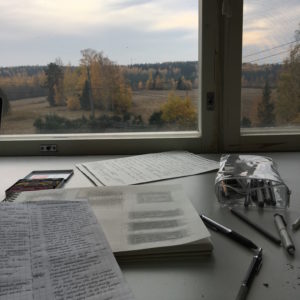
Arteles Creative Center, Haukijärvi, Finland, October, 2018. A desk with a beautiful view of the pond in the shared studio space.
I had wanted a residency experience for several years, finding my life at home cluttered with ‘shoulds’, and obligations. When the time was finally right—in 2018—I applied for, and was invited to two residencies.
The first, at the Anderson Center in Redwing, Minnesota, was in early May. It was my first time away from family for many years, so I settled on two weeks instead of a month-long period. The timing was perfect; spring was all around, and the adjacent walking/bike path was lined with wildflowers and a fresh green blanket. Five multidisciplinary artists (three writers and two visual artists) shared the mansion where an inventor once lived and developed all kinds products, including puffed wheat! The house provided not only private sleep/study rooms, but also a multitude of lounges and nooks to settle in for some thinking, reading or writing. A marvelous cook took care of meals, and left us enough food so there was no cooking necessary, although she also provided groceries. Our dinners on the screen porch were filled with laughter and conversation.
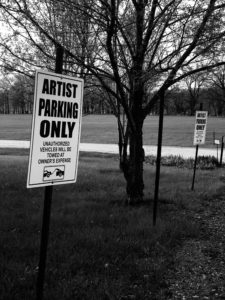
Anderson Center, Redwing, MN parking lot sign, May, 2018. Artists are top dogs here!
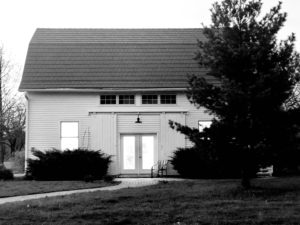
The Print Studio at Anderson Center, Redwing, MN, May 2018. Working all hours. Photo: C. Anthony Huber.
I also had exclusive use of the well-equipped print studio. Each day after a simple breakfast, I’d walk to the studio to start work on the project I had planned. I had started a series of collagraph prints while in graduate school, and I hoped to finish a series of prints during the residency. Early on I figured out that was an unattainable goal, as I was also experimenting with adding drawing and watercolor to them. Changing gears, I focused on printing, so that later, when I was back in my own studio I could layer on the additional elements.
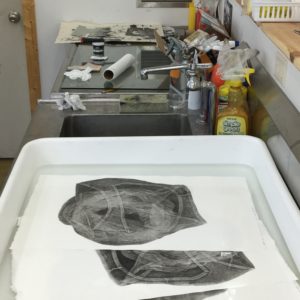
Anderson Center print studio, Redwing, MN, May, 2018. Interior view of studio with work in process.
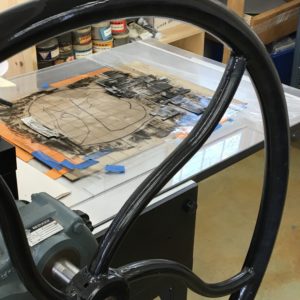
Anderson Center print studio, Redwing, MN, May 2018. Etching press and work in process.
The Anderson Center was a great fit for my first residency because it was only an hour drive from Minneapolis; just enough to be ‘away’. They had the printing press I needed, and it was a small contingent of cross-disciplinary artists. Extra bonuses were the delicious meals provided, and since it’s privately funded, there was no cost to attend. The application deadline for this year’s residencies is February 15th.
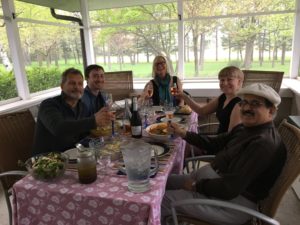
Anderson Center, Redwing, MN, May 2018. Dinner on the porch with (L to R) C. Anthony Huber, Kent Weigle, Anna Carlson, Molly Reid, Vishwas Gaitonde.
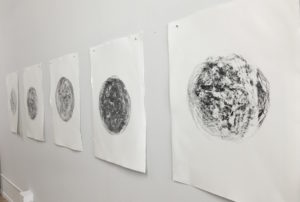
Anna Carlson’s Studio, Minneapolis, MN, June, 2018. Autumbra 1-5, varying edition of collagraphs on paper. These were made in the very last hours of my residency.
The second residency was a stretch for me; the whole entire month of October, and in Finland, a place far, far away. Arteles Creative Center has 12 themed residencies each year. Each month hosts 12-14 visual artists, musicians, performance artists, writers, and actors from all over the world. Located in a central Finland, this former rural school has grown into one of the largest residency programs in Scandinavia. The theme for the month of October was “EnterText.” Since I have been working with text since earning my MFA, it was a great fit. About a third of the artists were writers, and a third made visual work, and the last third were multi-disciplinary and performance artists. The diversity of ages, cultures, and experience made for exciting conversations (in English!) and lasting friendships.

Arteles Creative Center, Haukijärvi, Finland, October, 2018. Residents discussion in the living room.
We were housed in two long buildings. ‘Blue House’, where my room was, also had the shared studio, living room, and a kitchen for us to cook our own meals. ‘Orange House’ had five rooms and a shared kitchen, along with residency the offices and rooms for the two live-in assistants. Arteles Creative Center is surrounded by a magical forest that is open to all for exploring. The residency car, public buses, or bicycles took us for excursions further out.
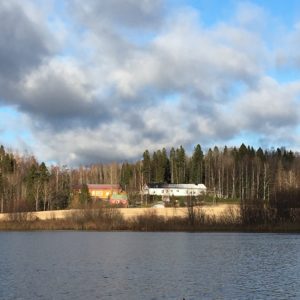
Arteles Creative Center, Haukijärvi, Finland, October, 2018. Watching the seasons change from a rowboat on the pond. The two long buildings are the Arteles campus.
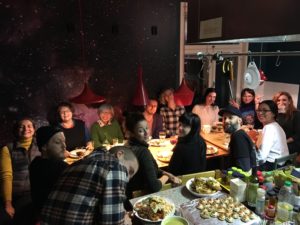
Arteles Creative Center, Haukijärvi, Finland, October, 2018. We all planned activities during the month. The Resident’s potluck dinner was a big hit!
I found it more difficult to get into a groove there, possibly due to jet-lag, negotiating the shared studio space, and the overwhelming feeling of “what am I going to do here for a whole month?” I was glad I brought some simple stitching to work on while I found my flow. Once I did, the time was extremely productive for my project: exploring the process of memory recall through storytelling. I stitched, I drew, I walked, I listened, and I wrote.
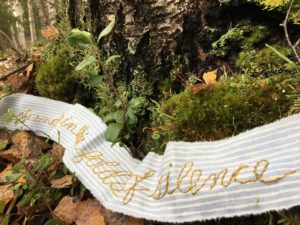
Arteles Creative Center, Haukijärvi, Finland, October, 2018. Embroidered poem installation that I left as a mark of my presence.
From these two residencies I’ve gained new work practices, explored my artwork deeply and broadly, and took big steps forward on two projects. If this sounds like something you’d like to do, check out Resartis, Artist Communities, or Residency Unlimited for options.
A few notes about what to expect, how to prepare, what to bring, arriving and leaving your residency, and finding your workflow:
- Expect people to leave you alone, unless you ask for help or company. That said, make a point to connect with your fellow residents, you’ll be rewarded.
- Expect your family and friends to respect your time for your work. How much communication you want is up to you. Set times and days its ok to call or text, and put a message on your email saying you may not respond immediately.
- Expect to have big ideas about the work you will accomplish, and be happy with whatever you do get done.
- Prepare by thinking about what you want to accomplish, and how you will do that. Include some personal intentions like exercising and self-care.
- Bring an easy project already started, a project you want to complete, and something entirely new to explore. Bring the tools that you can’t live without, a sketchbook, and a minimal amount of materials for the projects you intend to work on. Consider challenging yourself to use found, scavenged, or recycled materials at the site. Pack minimal clothing (there’s no fashion show). It’s really nice to have a favorite shawl or sweater, a book or two, and a ‘luxury item’ like your own pillow or soft towel.
- Arriving at your residency is exciting! Participate in any/all introduction activities, walk around and observe where you are and who is there with you, set up a few things in your room or studio that will get you motivated to work. Finding your flow may come easily, or be elusive and difficult. If you have trouble getting into the work, take your time, talk with other residents, read a book, work outside, etc.
- Leaving your residency is bitter and sweet. You’ll think it went too fast, and you’ll be ready to see family. You’ll be sorry to leave your new friends, and may have anxiety about continuing your work. Take some time to journal about what was positive and unexpected or challenging, and what your next steps are after you get back. Gather with your artist friends to share your experience and celebrate the work you produced.
There’s more details about the work I did, and how these residencies have continued to influence me in my blog. If you have any questions about residencies, I’d be happy to answer via email.
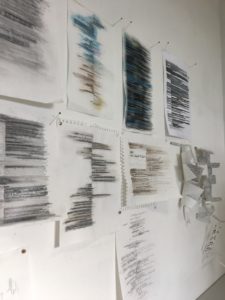
Arteles Creative Center, Haukijärvi, Finland, October, 2018. On the last day, the public was invited to a presentation of the work. These are my experimental sketches with text, oil and water-based drawing materials.



Related Blog Articles
No related blog articles yet.